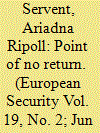|
|
|
Sort Order |
|
|
|
Items / Page
|
|
|
|
|
|
|
| Srl | Item |
| 1 |
ID:
129579


|
|
|
|
|
| Publication |
2014.
|
| Summary/Abstract |
This article questions the effectiveness of EU efforts to prevent terrorism and violent radicalization as well as the future prospects of such efforts. Driven by the pressure of attacks, member states have agreed on a comprehensive strategy to prevent radicalization and recruitment into terrorism, but simultaneously the strategy traces the limits of EU authority in member states in this regard. Meanwhile, the European Commission has focused on indirect measures, such as research support, for counter radicalization. However, over time, both flexible cooperation among a subset of member states and new EU initiatives have generated only few or biased policy outputs. The Stockholm Programme renewed the ambition to prevent terrorism at an early stage and underlined the EU's role in evaluation and knowledge exchange. This article questions the resulting proposal to create a network of local or subnational actors for best practice exchange. The article argues that preventive counterterrorism relies on contentious scientific evidence and that authoritative evaluations remain tied to national policy-making. Finally, the EU Commission cannot mobilize sufficient resources to ensure that 'frontline' organizations, such as police services, implement new practices. Taken together, this limits the potential for depoliticizing multilevel governance approaches to terrorism prevention. The conclusions of this article raise further research questions on the use of knowledge and complex governance patterns in EU internal security.
|
|
|
|
|
|
|
|
|
|
|
|
|
|
|
|
| 2 |
ID:
129577


|
|
|
|
|
| Publication |
2014.
|
| Summary/Abstract |
Following several months of uncertainty in the wake of the rejection of the treaty establishing a constitution for Europe, the Lisbon Treaty eventually entered into force in December 2009. Although it fell short of establishing a constitution for the European Union (EU), it introduced several noteworthy changes, notably for EU internal security policies, also known as the 'Area of Freedom, Security and Justice' (AFSJ). This special section considers how various dimensions of the AFSJ have been affected by the Lisbon Treaty and the gradual reinforcement of supranational governance that it has generated in this key policy area. Over the past decade, the AFSJ has experienced tremendous development, making it one of the most dynamics areas of European integration. The AFSJ is a broad and heterogeneous policy domain, which includes asylum, immigration and border policies, counter-terrorism, justice and police cooperation, as well as the external dimension of these activities. Given the crucial importance of current internal security threats, such as terrorism, and the sensitivities surrounding policy responses to them, it is necessary to take stock of how far the EU has progressed toward its goals of an AFSJ and how this has been influenced by the most recent treaty changes. To accomplish this goal, this special section brings together some of the most distinguished scholars in the field and several younger scholars conducting cutting-edge research on the AFSJ.
|
|
|
|
|
|
|
|
|
|
|
|
|
|
|
|
| 3 |
ID:
101139


|
|
|
|
|
| Publication |
2010.
|
| Summary/Abstract |
The entry into force of the Treaty of Lisbon has raised new expectations in the area of freedom, security and justice (AFSJ). The extension of co-decision increases the capacity of the European Parliament (EP) to have an influence on decision-making. This article engages with securitisation theories in order to analyse the evolution of the AFSJ as well as the role of its main actors in the securitisation process. It evaluates the past role of the EP as well as the recent changes introduced by the extension of co-decision in order to establish whether it will become a new securitising actor or will have the potential for de-securitisation of the agenda. The macro-institutional changes in the Treaty of Lisbon indicate that the EP will have opportunities to de-securitise, although the emphasis on EU citizens' rights introduced in the Stockholm programme offers it a chance to appeal to domestic audiences at the expense of more diffuse issues such as immigration and asylum.
|
|
|
|
|
|
|
|
|
|
|
|
|
|
|
|
|
|
|
|
|